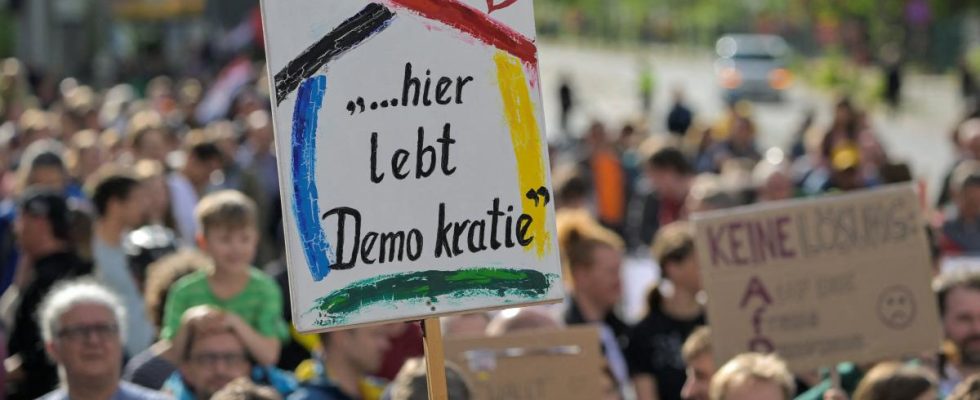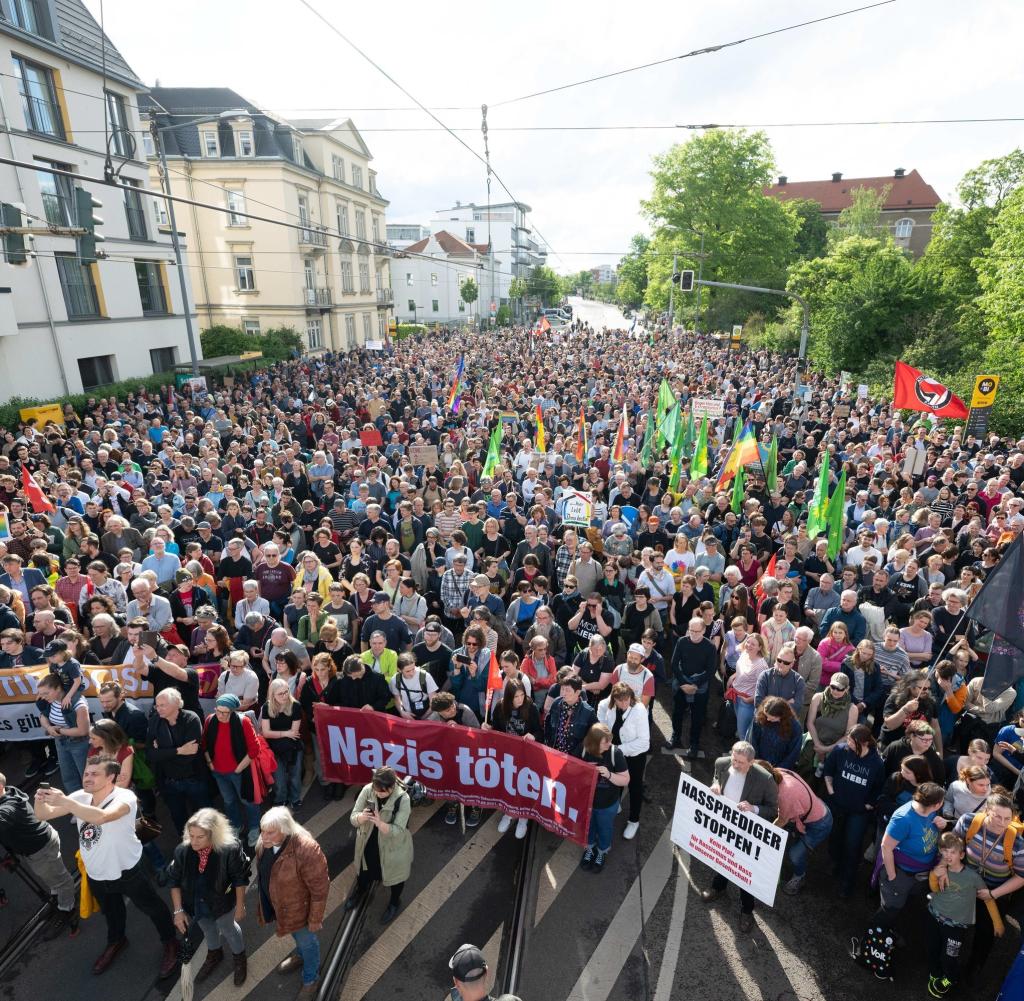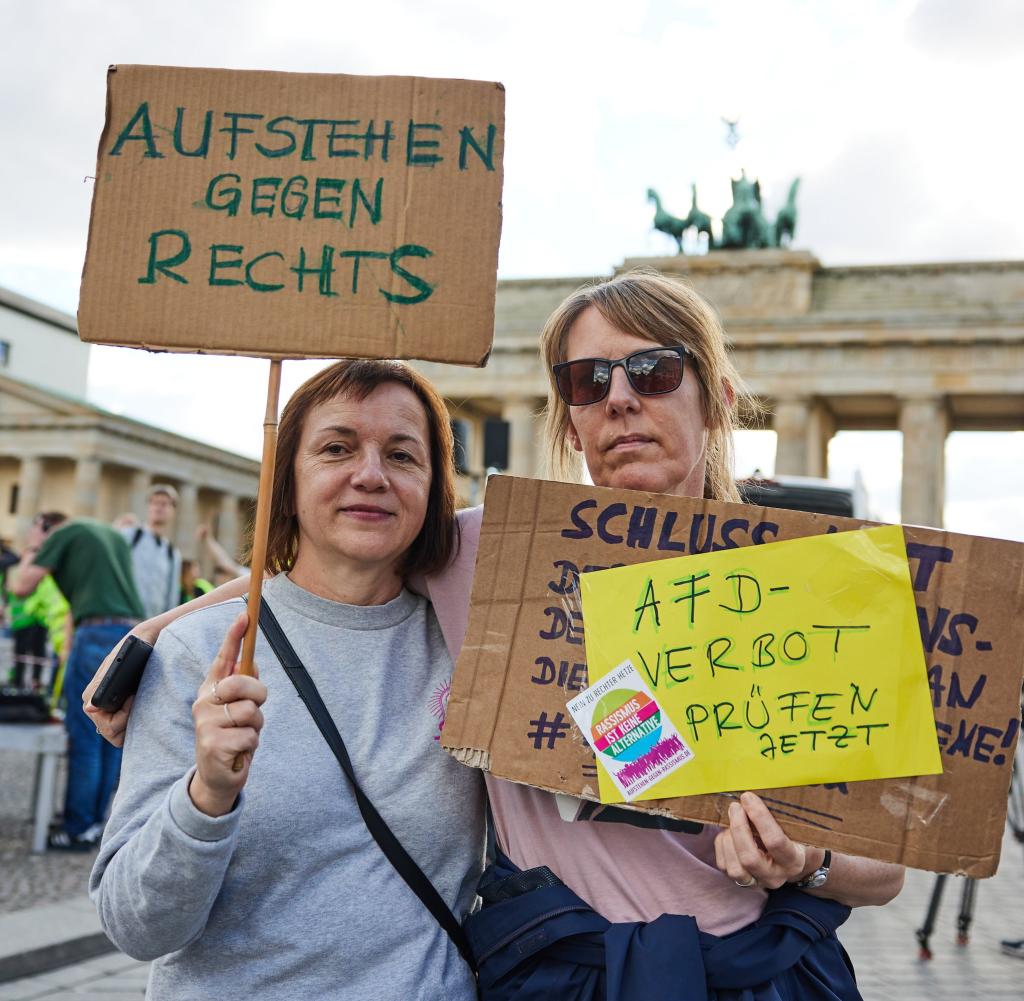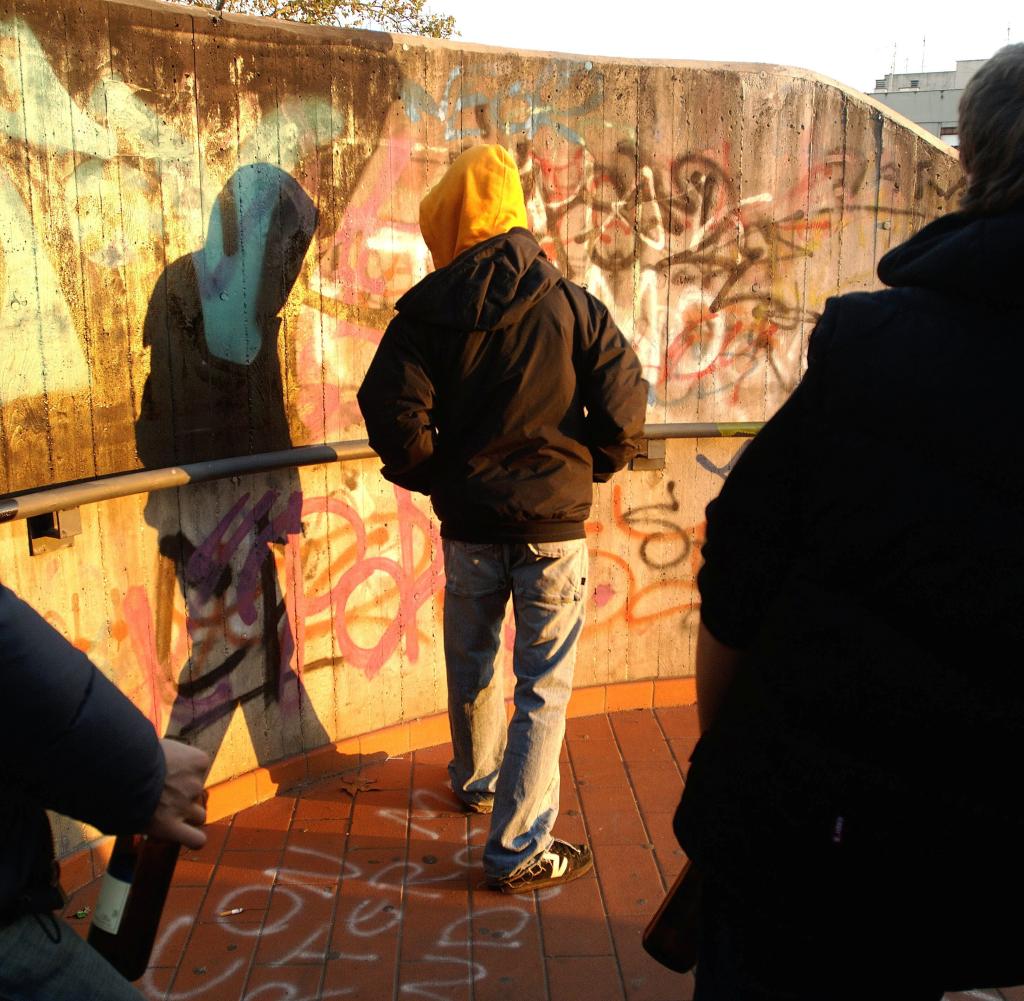Dhe brutal attack on the Dresden SPD European politician Matthias Ecke caused horror across Germany – and sparked a debate about the escalation of violence in the election campaign. In Dresden and Berlin, several thousand people demonstrated for democracy and against violence.
After the attack that took place in Dresden, a 17-year-old turned himself in to the police. The State Criminal Police Office (LKA) said he went to the police on Sunday night and stated that he was the perpetrator. The background to the attacks on Ecke and previously on a Green Party campaign worker carried out by four young men on Friday evening was still unclear at the weekend. On Sunday evening, the police announced on the X platform (formerly Twitter) that the suspect had not yet commented on the motive for the crime.
“Striesen Declaration” warns of escalating violence
In response to the attack, more than a hundred federal politicians condemned the increasing violence against Democratic politicians in a joint statement. They stand “united and together against the ever-escalating violence against politically active people in public spaces,” said the signatories of the statement published on the website of the Brand New Bundestag organization on Sunday “Striesen Declaration”.
The signatories include SPD leader Lars Klingbeil, Green Party leader Ricarda Lang and FDP parliamentary group deputy Konstantin Kuhle. First the “Mirror” reported the statement.
“Sometimes we don’t have much in common politically – sometimes nothing,” the letter says. “We are divided in colors but united in this cause. That’s why we say: this far and no further. Matthias Ecke’s slap in the face was a slap against all of us – and against democracy itself.”
Federal Interior Minister Nancy Faeser is calling for better protection for politicians and helpers during election campaigns. “We need even more visible police presence on site to protect Democrats at campaign stands and at events,” said the SPD politician to the “Rheinische Post”.
“In terms of the rule of law, we must now act more harshly against violent criminals and more protection for democratic forces,” she emphasized. She will discuss this “very quickly” with the interior ministers of the federal states. Politically, the shared responsibility of those who “attack and defame increasingly unrestrained and unscrupulous democrats, especially from the right-wing fringe,” must be clearly stated.
SPD politician is in hospital
Corner was on Friday evening Dresden district of Striesen was attacked by four perpetrators and seriously injured. The group had previously attacked a 28-year-old who was putting up election posters for the Greens. They punched and kicked the man, who sustained injuries. According to the LKA, the 17-year-old who now turned himself in had not previously appeared to the police. According to information from “Bild” newspaper The teenager showed up at the station with his mother.
The other as yet unknown suspects are still being investigated, it said. The police state security took over the investigation. The background to the attacks on Ecke and previously on a Green Party campaign worker carried out by four young men on Friday evening was still unclear at the weekend. Election posters from various parties were also damaged in Leipzig and Taucha, the police said.
Many people demonstrated against violence in Dresden
Source: dpa/Sebastian Kahnert
Ecke is the Saxon SPD’s leading candidate for the European elections. He suffered a fracture of his cheekbone and eye socket as well as hematomas on his face, said Saxony’s SPD leader Henning Homann on Sunday afternoon. Ecke was operated on on Sunday and is doing well given the circumstances. The SPD Saxony assumes that he will continue his election campaign.
Around 1,000 demonstrators and political celebrities in Berlin
In Berlin According to the police, around 1,000 demonstrators gathered at the Brandenburg Gate; according to later information from the organizers, there were ultimately around 3,000 people. These included the Green Party chairmen Ricarda Lang and Omid Nouripour, SPD leader Lars Klingbeil and the Prime Ministers of Saxony and North Rhine-Westphalia, Michael Kretschmer and Hendrik Wüst (both CDU).
People in Berlin also followed the call
Source: dpa/Jörg Carstensen
Also in Dresden According to police, around 1,000 people demonstrated 2000 people for democracy and against violence. They gathered early on Sunday evening in the Striesen district. East Germany fought for and fought for democracy in 1989, said Bundestag Vice President Katrin-Göring-Eckardt (Greens) at the start. “And we will not give in to those who make democracy contemptible.” And we will certainly not give in “if one of us has to experience violence,” emphasized the politician.
“We are the people,” Göring-Eckardt continued. Among the participants at Pohlandplatz were the federal chairwoman of the SPD, Saskia Esken, Minister of State for Culture Claudia Roth (Greens) and Saxony’s Justice Minister Katja Meier (Greens).
Saxony’s Interior Minister Armin Schuster (CDU) explained: “We will continue the investigation meticulously and keep the pressure high.” He could also “only encourage the other perpetrators to report to the police.” Such a “brutal attack on election workers and politicians, but also on We will not tolerate the foundations of our democracy and the conduct of free elections,” emphasized Schuster.
Other parties are also the target of attacks: According to police, an AfD member of the state parliament was beaten at an information stand in Nordhorn, Lower Saxony, on Saturday morning. In Dresden, two 23-year-old women and a 28-year-old man suddenly attacked a party information stand on Saturday and damaged displays, posters and a table, the police said. The operator of the stand was not injured. The police identified the suspects following information from witnesses.
The incidents are part of a nationwide series of attacks on party members before the local and European elections on June 9th: On Thursday, Bundestag member Kai Gehring (Greens) and his party colleague Rolf Fliß said they were attacked and Fliß was beaten in Essen. A few days ago, Bundestag Vice President Katrin-Göring-Eckardt (Greens) was aggressively harassed after an event in eastern Brandenburg and prevented from leaving for a long time.
The Greens are targeted by attackers, followed by the AfD
The target group of the attackers has recently shifted somewhat: in 2019, representatives of the AfD were primarily the target of hostility, but now it is the Greens. According to preliminary figures, 478 cases were recorded nationwide for the AfD last year, and 1,219 for the Greens. There were 420 for the SPD, fewer for other parties – a total of 2,790 such crimes were reported, as the government announced in response to an AfD query.
The Greens are therefore calling for more protection in the election campaign. “The interior ministers must now present concepts for the best possible protection of politicians and, above all, volunteer campaigners,” said the Federal Managing Director Emily Büning the German Press Agency. Cooperation with the police and the state criminal investigation offices is essential. “We will now once again reinforce the recommendation in our district associations that every event and every election campaign should be reported to the security authorities in advance.”
Politicians across party lines condemned violence in political debates. Chancellor Olaf Scholz (SPD) said: “Democracy is threatened by something like this, and that is why shrugging acceptance is never an option.” Vice Chancellor Robert Habeck (Greens) explained about the attacks: “They are the disgusting and inexcusable result of a brutalization of language, debate and disinhibition in the so-called social media.” He went on to say: “These attacks, they are not a private problem. They concern us all.” Such attacks were intimidating. “We can only counteract this intimidation if we stick together (…) There are more of us, there are many of us, let’s stick together,” he said.
Federal Minister of Justice Marco Buschmann (FDP) wrote on the Platform X: “Violence is not a legitimate means of political debate. From nobody. Against no one. Period.” Finance Minister Christian Lindner (FDP) warned on X: “The disinhibition of political debate affects us all. Anyone can be next.”
CDU boss Friedrich Merz appealed to “carry out election campaigns with due respect and, above all, without any aggression, especially without physical violence”. This applies regardless of which party the campaigners belong to, “my own, the SPD, the Greens, the FDP, whoever.”
Also the AfD chairman Tino Chrupallawhose party is blamed by some for an atmosphere conducive to violence, wrote on the Platform X: “We deeply condemn physical attacks against politicians of all parties. Election campaigns must be tough and constructive in terms of content, but without violence.”
The President of the German Association of Cities, Markus Lewe, called for harsher penalties. “We have to better protect politically active people. A tightening of criminal law could also help, which persecutes stalking, marches in front of residential buildings and threats against the families of politicians,” he told the “Rheinische Post”.
North Rhine-Westphalia’s Interior Minister Herbert Reul (CDU) called for more concrete reactions than before in such incidents. He asked himself, “why the same song is played every time something like this happens?” Reul told the “Rhenish Post“. “Condemn, discuss, hold meetings? This doesn’t help anyone.” All Democrats must now stand together and take concrete action.
“What is needed now is decisive, solidarity-based action by all state institutions against this increasing willingness to use violence, consistent prosecution with effective judgments and finally respectful coexistence in society again,” he demanded.




